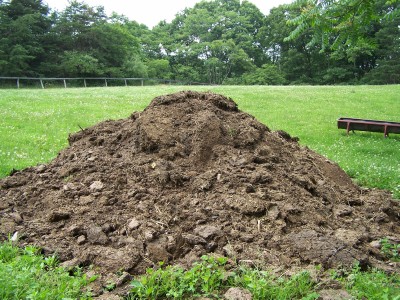Compost
Someone I knew told me years ago about growing up in rural Europe. He said that there a person’s wealth was measured by the barnyard manure pile. I admit I never really understood the remark until recently.
Growing up, we seldom had a garden, so this has been an acquired skill. I have diligently followed expert gardeners’ advice with mixed results. The assumption was always that if you planted seeds in the dirt, weeded and took care of them, you’d have plants. These guides left out an extremely important element though, an element whose absence meant using fertilizers and pesticides; that element is composted manure.
We have been gardening “organically” for years, and transitioning to permaculture methods. Recently, we have worked diligently to improve our soil, remembering that it is not just dirt, but home to innumerable living organisms that help the plants to live and assimilate nutrients. In our garden trials, we often use different methods to see which are the most beneficial. Our tests so far show an unquestionable advantage for the use of composted manure.
In this picture, I have combined two photographs of cucumbers. Both were planted in seed trays at the same time, and transferred into the garden the same day. The top one went into the soil created by mulch layers as recommended by Toby Hemminway in his book, Gaia’s Garden. The bottom one, was planted into an area where we placed almost 6 inches of composted manure in order to raise the angle of the bed. While the two plants are only feet apart, the difference is staggering. The top plant is stunted and will most likely never produce anything, a problem that I had throughout much of my garden last year. The area with manure, though, has produced a superabundance and you can see a salad cucumber growing under the shade of its leaves.
Our success was not limited to the cucumbers. Here you can see beets that are healthy, vibrant green and have almost no insect damage.
What Eliot Coleman pointed out in his book, The Four Season Harvest, has been confirmed in our own garden. If the soil is providing adequate nutrition, the plants will be healthy and insects will not bother them. Compost is providing the ideal environment, making even organic pesticides unnecessary. In areas without the compost, with only the layers of hay and mulch, the nutrition is lacking, forcing us to come up with methods to help our suffering plants along.
Gene Logsdon shows in his irreverently title book Holy Shit: Managing Manure to Save Mankind that intelligent use of animal and even human waste can contribute toward improving agriculture with a resource that is literally put in the sewer. While I don’t agree with all his conclusions, it is a thought provoking book, and may contribute to opening people’s’ minds regarding the cycles of life.
Ad nauseum I read and hear that mankind must become vegetarian in order to “save the planet.” Dire predictions state that eating meat is wasteful and bad for the environment. What our garden, and others like Eliot Coleman’s have shown is that the vegetarian assertion is a grave error. WITHOUT the animals, plant production suffers. It is only by combining the plant and animal resources of a farm that we can create a perpetual, healthful balance.
It is not difficult to compost animal manure. One of the most important steps is to turn the pile frequently. You can see that our pile (this is just one of them) is not contained so that our small tractor can turn it from each side. The pile above has already broken down a great deal. By next spring it will be ready to place in the gardens without burning the plants.
There are many free videos on creating compost, and don’t forget to check with your local farmers who may be glad to share the bounty ![]()




Trackbacks/Pingbacks
[…] year, I demonstrated in an article called “Compost” the amazing results of using compost in the garden. Mr. Kempf discusses the benefits of compost […]